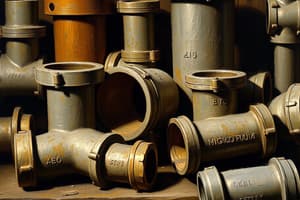Podcast
Questions and Answers
Plastic pressure pipe is now used less commonly than a few years ago.
Plastic pressure pipe is now used less commonly than a few years ago.
False (B)
What is the maximum length of plastic pressure pipe available in coils?
What is the maximum length of plastic pressure pipe available in coils?
- 50.0m (correct)
- 100.0m
- 1.5m
- 3.0m
What type of action does a pipe cutter use to cut plastic tubing?
What type of action does a pipe cutter use to cut plastic tubing?
Shearing
The ______ of a pipe cutter becomes blunt over time and needs to be replaced.
The ______ of a pipe cutter becomes blunt over time and needs to be replaced.
Match the following features of a pipe cutter to their descriptions:
Match the following features of a pipe cutter to their descriptions:
What is the primary difference between a copper pipe slice and a plastic pressure pipe slice?
What is the primary difference between a copper pipe slice and a plastic pressure pipe slice?
Pipe slices should be lubricated regularly to prevent rust formation.
Pipe slices should be lubricated regularly to prevent rust formation.
What is the primary function of an adjustable spanner?
What is the primary function of an adjustable spanner?
An adjustable spanner should be used for tightening or loosening nuts, not with ______.
An adjustable spanner should be used for tightening or loosening nuts, not with ______.
Match the following tools with their primary purpose:
Match the following tools with their primary purpose:
What is the primary reason for keeping cutting edges sharp?
What is the primary reason for keeping cutting edges sharp?
It is recommended to clean and dry cutting tools after use to prevent rust.
It is recommended to clean and dry cutting tools after use to prevent rust.
What is the primary safety precaution to take when using tools with cutting edges?
What is the primary safety precaution to take when using tools with cutting edges?
Flashcards
Pipe Slice
Pipe Slice
A tool to cut pipes cleanly and straight without support rollers.
Disposable Pipe Slices
Disposable Pipe Slices
Pipe slices that are usually thrown away when blunt; some have replaceable blades.
Adjustable Spanner
Adjustable Spanner
A general-purpose tool for tightening or loosening nuts with a movable jaw.
Correct Positioning of Spanner
Correct Positioning of Spanner
Signup and view all the flashcards
Lubrication of Spanners
Lubrication of Spanners
Signup and view all the flashcards
Tool Maintenance
Tool Maintenance
Signup and view all the flashcards
Sharp Cutting Edges
Sharp Cutting Edges
Signup and view all the flashcards
Finger Safety with Tools
Finger Safety with Tools
Signup and view all the flashcards
Plastic pressure pipe
Plastic pressure pipe
Signup and view all the flashcards
Pipe cutter
Pipe cutter
Signup and view all the flashcards
Length options for plastic pipe
Length options for plastic pipe
Signup and view all the flashcards
Importance of pipe flexibility
Importance of pipe flexibility
Signup and view all the flashcards
Fewer joints benefit
Fewer joints benefit
Signup and view all the flashcards
Pipe cutter design variations
Pipe cutter design variations
Signup and view all the flashcards
Disposable pipe cutters
Disposable pipe cutters
Signup and view all the flashcards
Replacement blades for cutters
Replacement blades for cutters
Signup and view all the flashcards
Study Notes
Plastic Pressure Pipework - Hand Tools
- Plastic pressure pipe is now commonly used, in straight lengths of 3 meters or coils up to 50 meters.
- It's flexible, allowing easy fitting under floors and in voids, reducing the number of joints and lessening the risk of leaks.
- Ideal for hot and cold water systems, including central heating.
Hand Tools - Pipe Cutter
- Pipe cutters use a shearing action to cut plastic pipe.
- Different designs exist among manufacturers, some including ratchets.
- Many cutters are disposable; if the blade becomes blunt, a new tool is needed. Some manufacturers offer replacement blades.
- Blade sharpness is critical for effective cutting.
Hand Tools - Pipe Slice
- Pipe slices are similar to those used for copper pipe.
- Different from the pipe cutter, they lack the support rollers present in copper cutters opposite the cutting disc.
- They produce clean, straight cuts.
- Typically disposable, although some manufacturers offer replacement blades.
- Most have a plastic body.
Hand Tools - Adjustable Spanner
- The adjustable spanner is a general-purpose tool for tightening and loosening nuts.
- Designed where a single-side flat nut is concerned; use this spanner, not grips.
- The head's shape guides correct positioning on the nut, minimizing slippage when applying force.
- Forged steel construction necessitates regular lubrication of the moving worm and jaw to prevent rust caused by damp conditions.
Maintenance
- Tools must be maintained to optimize performance and safety.
- Thorough cleaning and drying of cutting tools are crucial, as blades can rust.
- Lubrication is not required for all tools; keeping the cutting blade sharp is important.
Maintenance and Safety
- Sharp edges require awareness and safety precautions.
- Using gloves may be necessary for protection.
- Never place fingers inside pipe cutters to avoid severe cuts.
Safety
- Exercise careful handling when using tools or potentially harmful tools to prevent injuries like finger trapping.
- Pay attention to maintaining safe distances between fingers and handles when the pipe cutter has made the desired cut.
- Adjust the spanner to the right size to avoid slippage and finger injuries.
PPE
- Appropriate personal protective equipment (PPE) reduces injury risk during plastic pipe cutting.
- Always wear the required PPE.
Studying That Suits You
Use AI to generate personalized quizzes and flashcards to suit your learning preferences.




